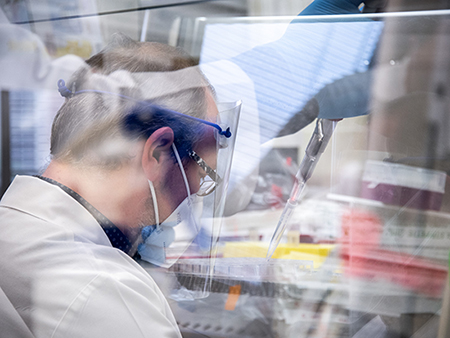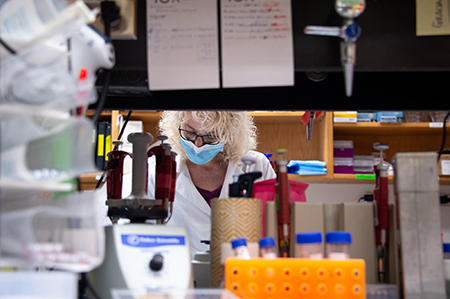 Anthony Fauci, M.D., one of the lead members of the White House Coronavirus Task Force focusing on the COVID-19 pandemic in the United States, and Kathleen Neuzil, M.D., one of the world’s most influential research scientists and advocates in vaccine development and policy, delivered keynote addresses to more than 2,000 trainees, faculty, staff and invited guests today as part of the University of Alabama at Birmingham’s virtual COVID-19 Research Symposium.
Anthony Fauci, M.D., one of the lead members of the White House Coronavirus Task Force focusing on the COVID-19 pandemic in the United States, and Kathleen Neuzil, M.D., one of the world’s most influential research scientists and advocates in vaccine development and policy, delivered keynote addresses to more than 2,000 trainees, faculty, staff and invited guests today as part of the University of Alabama at Birmingham’s virtual COVID-19 Research Symposium.
Fauci, director of the National Institute of Allergy and Infectious Diseases, gave the symposium’s kickoff keynote address where he was welcomed and introduced by “my good friend, Mike Saag” [UAB professor and infectious diseases researcher Michael Saag, M.D.], whom he thanked for the invitation to speak to the university. Fauci spoke for almost 20 minutes on the public health and scientific challenges of the historic COVID-19 pandemic and what’s next — which he hopes is a vaccine candidate in the very near future.
“I can predict, I believe with some degree of certainty, that by the end of November to the beginning of December, we will know — based on the size of the trial and rate of infections that are ongoing in this country — if we will have a safe and effective vaccine,” Fauci said. “I feel cautiously optimistic that we will have a safe and effective vaccine even though you can never make absolute predictions when it comes to vaccinology.”
Neuzil, director for the Center for Vaccine Development and professor in the Departments of Medicine and Pediatrics at the University of Maryland School of Medicine, concluded the symposium with a second keynote address highlighting the work on national COVID-19 vaccines.
Neuzil noted in her talk that “UAB has been a major player” in vaccine trial design and execution due to the leadership role played by UAB faculty in groups including the Infectious Diseases Clinical Research Consortium and HIV Prevention Trials Network.
“The fact that two prominent national leaders such as Dr. Fauci and Dr. Neuzil were keynote speakers at the UAB COVID-19 Research Symposium speaks not only to the importance and timeliness of the topic but also to the critical role that UAB is playing in the effort to combat this pandemic,” said Christopher Brown, Ph.D., vice president for Research at UAB.
 UAB is involved in more than a dozen clinical trials testing potential therapies for COVID-19. Numerous research projects have been funded in part by the Urgent COVID Research Fund, a philanthropic support fund established in late spring. UAB launched a second round of urgent, high-impact COVID-19 research funding in August. A list of 22 clinical trials UAB is currently involved in is available at Clinicaltrials.gov. UAB also has been part of the development of remdesivir, along with the NIH, and tested a COVID-19 vaccine candidate created by Altimmune Inc., in which the preclinical data recently showed effectiveness.
UAB is involved in more than a dozen clinical trials testing potential therapies for COVID-19. Numerous research projects have been funded in part by the Urgent COVID Research Fund, a philanthropic support fund established in late spring. UAB launched a second round of urgent, high-impact COVID-19 research funding in August. A list of 22 clinical trials UAB is currently involved in is available at Clinicaltrials.gov. UAB also has been part of the development of remdesivir, along with the NIH, and tested a COVID-19 vaccine candidate created by Altimmune Inc., in which the preclinical data recently showed effectiveness.
The COVID-19 Research Symposium highlighted SARS-CoV-2 research and clinical trials, including global vaccine development, basic science surrounding COVID-19, therapeutics and population health. SARS-CoV-2 is the virus that causes COVID-19.
Moderators and presenters throughout the day included Frances Lund, Ph.D., Charles H. McCauley Professor and Chair in the Department of Microbiology; Paul Goepfert, M.D., director of the Alabama Vaccine Research Clinic and professor in the Division of Infectious Diseases; Jeanne Marrazzo, M.D., director in the Division of Infectious Diseases; Nathan Erdmann, M.D., Ph.D., assistant professor in the Division of Infectious Diseases; Sixto Leal, M.D., Ph.D, director of Clinical Microbiology, Fungal Reference Laboratory, and assistant professor in the Department of Pathology; Kent Keyser, Ph.D., associate vice president for Research; Kevin Harrod, Ph.D., professor in the Department of Anesthesiology and Perioperative Medicine; Steven Rowe, M.D., director of the Gregory Fleming James Cystic Fibrosis Research Center; Andrew B. Crouse, Ph.D., director of Research and Operations at the Institute for Precision Medicine; Mona Fouad, M.D., senior associate dean of Diversity and Inclusion; and Selwyn Vickers, M.D., senior vice president for Medicine at UAB and dean of the School of Medicine.
The symposium was open to all trainees, faculty and staff at UAB and special guests by invitation.
Organizers of the conference were Tika Benveniste, Ph.D., senior vice dean for Basic Sciences; Matt Might, Ph.D., director of the Hugh Kaul Precision Medicine Institute; Jeanne Marrazzo, M.D., director in the Division of Infectious Diseases; and Kent Keyser, Ph.D., associate vice president for Research.